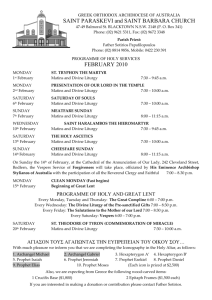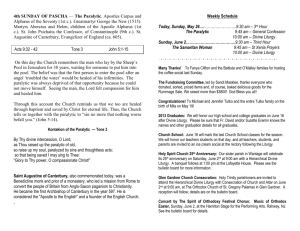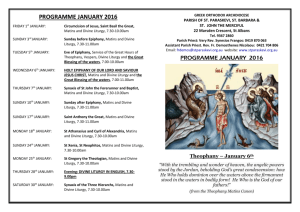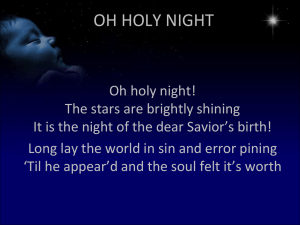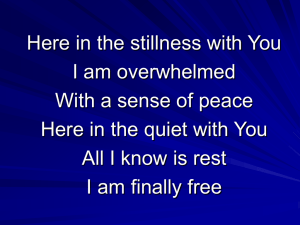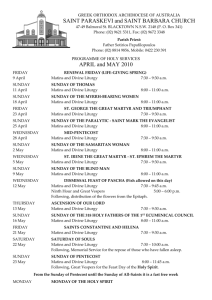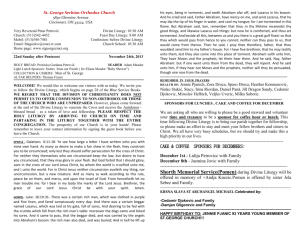programme october 2013
advertisement
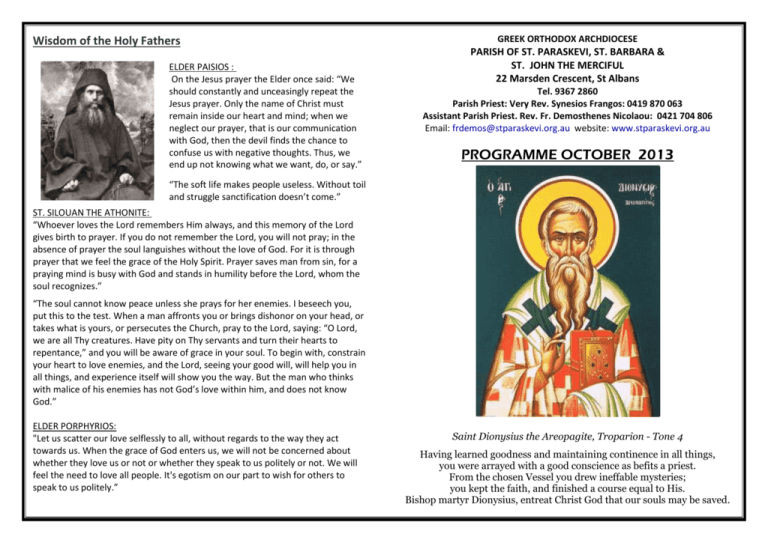
Wisdom of the Holy Fathers ELDER PAISIOS : On the Jesus prayer the Elder once said: “We should constantly and unceasingly repeat the Jesus prayer. Only the name of Christ must remain inside our heart and mind; when we neglect our prayer, that is our communication with God, then the devil finds the chance to confuse us with negative thoughts. Thus, we end up not knowing what we want, do, or say.” GREEK ORTHODOX ARCHDIOCESE PARISH OF ST. PARASKEVI, ST. BARBARA & ST. JOHN THE MERCIFUL 22 Marsden Crescent, St Albans Tel. 9367 2860 Parish Priest: Very Rev. Synesios Frangos: 0419 870 063 Assistant Parish Priest. Rev. Fr. Demosthenes Nicolaou: 0421 704 806 Email: frdemos@stparaskevi.org.au website: www.stparaskevi.org.au PROGRAMME OCTOBER 2013 “The soft life makes people useless. Without toil and struggle sanctification doesn’t come.” ST. SILOUAN THE ATHONITE: “Whoever loves the Lord remembers Him always, and this memory of the Lord gives birth to prayer. If you do not remember the Lord, you will not pray; in the absence of prayer the soul languishes without the love of God. For it is through prayer that we feel the grace of the Holy Spirit. Prayer saves man from sin, for a praying mind is busy with God and stands in humility before the Lord, whom the soul recognizes.” “The soul cannot know peace unless she prays for her enemies. I beseech you, put this to the test. When a man affronts you or brings dishonor on your head, or takes what is yours, or persecutes the Church, pray to the Lord, saying: “O Lord, we are all Thy creatures. Have pity on Thy servants and turn their hearts to repentance,” and you will be aware of grace in your soul. To begin with, constrain your heart to love enemies, and the Lord, seeing your good will, will help you in all things, and experience itself will show you the way. But the man who thinks with malice of his enemies has not God’s love within him, and does not know God.” ELDER PORPHYRIOS: "Let us scatter our love selflessly to all, without regards to the way they act towards us. When the grace of God enters us, we will not be concerned about whether they love us or not or whether they speak to us politely or not. We will feel the need to love all people. It's egotism on our part to wish for others to speak to us politely.” Saint Dionysius the Areopagite, Troparion - Tone 4 Having learned goodness and maintaining continence in all things, you were arrayed with a good conscience as befits a priest. From the chosen Vessel you drew ineffable mysteries; you kept the faith, and finished a course equal to His. Bishop martyr Dionysius, entreat Christ God that our souls may be saved. PROGRAMME OCTOBER 2013 TUESDAY 1st OCTOBER: PANAGIA GORGOEPIKOOS, Matins and Divine Liturgy AT THE GEELONG MONASTERY. WEDNESDAY 2nd OCTOBER: ST’S CYPRIAN AND JUSTINA, Blessing of the waters, Matins and Divine Liturgy, 7.30-9.30am rd THURSDAY 3 OCTOBER: Evening: English Paraklisis to the Mother of God, 7.00-7.30pm FRIDAY 4th OCTOBER: ST JOHN LAMPADISTIS, Matins and Divine Liturgy, 7.30-9.30am SUNDAY 6th OCTOBER: APOSTLE THOMAS, Matins and Divine Liturgy, 7.30-11.00am SUNDAY 13th OCTOBER: SUNDAY OF THE 7th ECUMENICAL COUNCIL, Matins and Divine Liturgy, 7.30-11.00am FRIDAY 18th OCTOBER: ST LUKE THE EVANGELIST, Matins and Divine Liturgy, 7.30-9.30am SATURDAY 19th OCTOBER: DIVINE LITURGY IN ENGLISH, 9.00- 10.00am SUNDAY 20th OCTOBER: ST GERASIMOS OF CEPHALONIA, Matins and Divine Liturgy, 7.30-11.00am WEDNESDAY 23rd OCTOBER: DIVINE LITURGY OF ST JAMES THE BROTHER OF THE LORD, at the Church of St Eustathios, Sth Melbourne, 8.00am SATURDAY 26th OCTOBER: GREATMARTYR DEMETRIOS THE MYRRHFLOWING, Matins and Divine Liturgy, 7.30-10.00am SUNDAY 27th OCTOBER: 7th SUNDAY OF LUKE, Matins and Divine Liturgy, 7.30-11.00am MONDAY 28th OCTOBER: HOLY PROTECTION OF THE THEOTOKOS, Matins and Divine Liturgy and Doxology for the National Feast day of “OXI”, 7.30-11.00am THE CROSS AND LOVE "I will not forget you! See, I have engraved you on the palms of my hands..." Isaiah 49:15-16 "It is not possible to represent and to think of the cross without love. Where the cross is, there is love. In church you see crosses everywhere and on everything, in order that everything should remind you that you are in the temple of the God of love, the temple of love crucified for us." St. John of Kronstadt Through the prayers of our Holy Fathers, Lord Jesus Christ our God, have mercy on us and save us! Amen! HALLOWEEN - Saint Nicholai Velimirovic As Orthodox Christians we must carefully examine every aspect of our involvement in the world, its activities, holidays and festivals, to be certain whether or not these involvements are compatible with our Holy Orthodox Faith. For a while now everything in the outside world is reminding us that Halloween is near: at school our children are busy painting pumpkins, cutting and pasting bats, ghosts and witches and planning the ideal costume in which to go trick-or-treating. Most of our schools, local community organizations and entertainment on television, radio and press will share in and capitalize upon the festival of Halloween. Many of us will participate in this festival by going to costume parties, or by taking our children trick-or-treating in our neighborhood after dark on October 31st. Most of us will take part in the Halloween festivities believing that it has no deeper meaning than fun and excitement for the children. Most of us do not know the historical background of the festival of Halloween and its customs. The feast of Halloween began in pre-Christian times among the Celtic peoples of Britain, Ireland and Northern France. These pagan peoples believed that physical life was born from death. Therefore, they celebrated the beginning of the “new year” in the fall, on the eve of October 31st and into the day of November 1st, when, as they believed the season of cold, darkness, decay and death began. Instructed by their priests, the Druids, the people extinguished all hearth fires and lights and darkness prevailed. According to pagan Celtic tradition, the souls of the dead had entered into the world of darkness, decay and death and made total communion with Samhain, the Lord of death, who could be appeased and cajoled by burnt offerings to allow the souls of the dead to return home for a festal visit on this day. The belief led to the ritual practice of wandering about in the dark dressed in costumes indicating witches, hobgoblins, fairies and demons. The living entered into fellowship and communion with the dead by this ritual act of imitation, through costume and the wandering about in the darkness. They also believed that the souls of the dead bore the affliction of great hunger on this festal visit. This belief brought about the practice of begging as another ritual imitation of the activities of the souls of the dead on their festal visit. The implication was that any souls of the dead and their imitators who are not appeased with “treats”, i.e. offerings, will provoke the wrath of Samhain, whose angels and servants could retaliate through a system of “tricks”, or curses. In the strictly Orthodox early Celtic Church, the Holy Fathers tried to counteract this pagan new year festival by establishing the feast of All Saints on that same day (in the East, this feast is celebrated on another day). The night before the feast (on “All Hallows Eve”), a vigil service was held and a morning celebration of the Eucharist. This custom created the term Halloween. But the remaining pagan and therefore anti-Christian people reacted to the Church’s attempt to supplant their festival by increased fervor on this evening, so that the night before the Christian feast of All Saints became a night of sorcery, witchcraft and other occult practices, many of which involved desecration and mockery of Christian practices and beliefs. Costumes of skeletons, for example, developed as a mockery of the Church’s reverence for holy relics. Holy things were stolen and used in sacrilegious rituals. The practice of begging became a system of persecution of Christians who refused to take part in these festivities. And so the Church’s attempt to counteract this unholy festival failed. This is just a brief explanation of the history and meaning of the festival of Halloween. It is clear that we, as Orthodox Christians, cannot participate in this event at any level (even if we only label it as “fun”), and that our involvement in it is an idolatrous betrayal of our God and our Holy Faith. For if we imitate the dead by dressing up or wandering about in the dark, or by begging with them, then we have willfully sought fellowship with the dead, whose Lord is not a Celtic Samhain, but satan, the evil one, who stands against God. Further, if we submit to the dialogue of “trick or treat,” our offering does not go to innocent children, but rather to satan himself. Let us remember our ancestors, the Holy Christian Martyrs of the early Church, as well as our Serbian New Martyrs, who refused, despite painful penalties and horrendous persecution, to worship, venerate or pay obeisance in any way to idols who are angels of satan. The foundation of our Holy Church is built upon their very blood. In today’s world of spiritual apathy and listlessness, which are the roots of atheism and turning away from God, one is urged to disregard the spiritual roots and origins of secular practices when their outward forms seem ordinary, entertaining and harmless. The dogma of atheism underlies many of these practices, denying the existence of both God and satan. Our Holy Church, through Jesus Christ, teaches that God alone stands in judgment over everything we do and believe and that our actions are either for God or against God. No one can serve two masters. Therefore, let us not, as the pagan Celts did, put out our hearth fires and wander about in the dark imitating dead souls. Let us light vigil lamps in front of our icons, and together with our families, ask God to grant us faith and courage to preserve as Orthodox Christians in these very difficult times, and to deliver us from the evil one. Cultivate That Quiet Light, Find Strength in God by Protodeacon Leonid Mickle I have often heard advice similar to that given by St. Seraphim of Sarov: Cultivate the quiet light of Christ within you, and with it you will enlighten those around you. At times, when contemplating the zeal which so many apostles demonstrated in their confession of the Faith before the world, I have wondered about that advice. We know that many are perishing, that many have either never even heard of the Orthodox Church, or are not aware that the Church is not an ethnic clubhouse, but a source of Living Water for all. Why are we not told to advertise, to go out with trumpets, drums, loudspeakers, bright lights, to make the Church more visible? God sometimes provides us with wonderful answers in unexpected settings. God sometimes provides us with wonderful answers in unexpected settings. Once, on a long journey, I stopped at a state information center to ask for the best route to my destination. The clerk asked me whether I really wanted the best route, or the quickest route. She pointed out that the best way would add about an hour to the fourteen-hour journey I could expect via the interstate, but that, if I had the time to take the alternate route, I would certainly enjoy the calm and beauty of some lovely country roads. Thinking about my schedule, I chose the interstate. I made excellent time — at least until I was pulled over for speeding. I had saved less than an hour, lost both a sizable percentage of my salary and an opportunity to become acquainted with some pretty country, and had briefly been driven to anger at a state police officer who was properly doing the job for which my taxes paid. The little things Shortly thereafter, I stopped in at a small church, almost two hours before the Vigil service was to begin. I found the priest trimming the wicks and replenishing the oil in the lamps behind the altar table. He told me that he almost always arrived at the temple well before the scheduled service, in order to maintain the oil lamps. I asked him whether he had ever considered using candles instead of oil lamps. He smiled, and said, “That certainly would be the quick way. I could enter and light the candles without giving them a thought. Without giving them a thought! Think how great a lesson would be lost! “Here, lighting the lamps, I must arrange my day so that I can be here early. I must concentrate on my task. I must see that there is an ample supply of oil, so that the lamps do not go out. I cannot hurry. I must pour carefully, lest the oil spill onto the altar table. I must trim and adjust the wick, then light it. and observe the flame: If it is too low, any little breeze may blow it out. If it is too high, it will generate such heat that the glass will crack, or at the least, will burn so quickly that the wick turns to ash, and the flame goes out. If I cannot be attentive to the little tasks which God permits me to take on, how can I hope to persevere in the greater tasks? “Such an apparently insignificant task, and yet, it is done in the House of God, and to the glory of God. If I cannot be attentive to the little tasks which God permits me to take on, how can I hope to persevere in the greater tasks? If I cannot take the necessary time and make the necessary effort to prepare these lamps, to see that the flame remains lit but does not become a self-destructive fire, how can I hope to do the same with my soul? How can I control my passions, and how can I instruct others to do the same? No, sometimes the quick way, the easy way, is not the best way. Glory to Thee, O Lord.’ While I was struck by his words, to my shame I found myself a little irritated by them. I found myself thinking that, yes, that may well be the best way, but he has the luxury of serving in a country church with a small congregation which does not put great demands on his time. He has the time, he has no secular job from which to rush to the church in time for services… Suddenly, I realized how irrational were my thoughts, and how cunning and persistent was the enemy of our salvation. When faced with an evident truth, the enemy challenges it by bringing to mind external, irrelevant details, diverting our attention away from the lesson. We are all given talents to be used to the glory of God throughout our journey toward salvation.

